名词全解[上学期]
图片预览
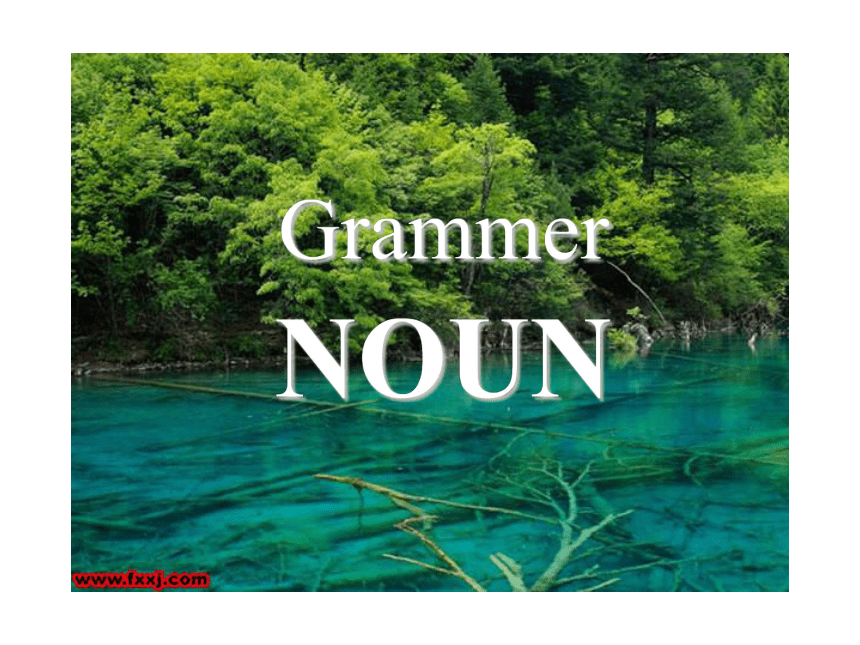

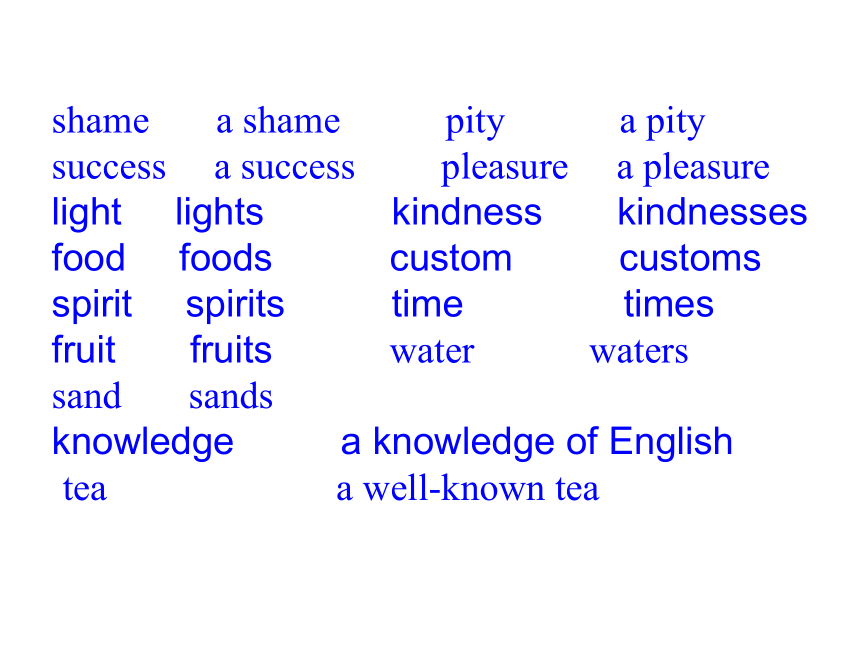
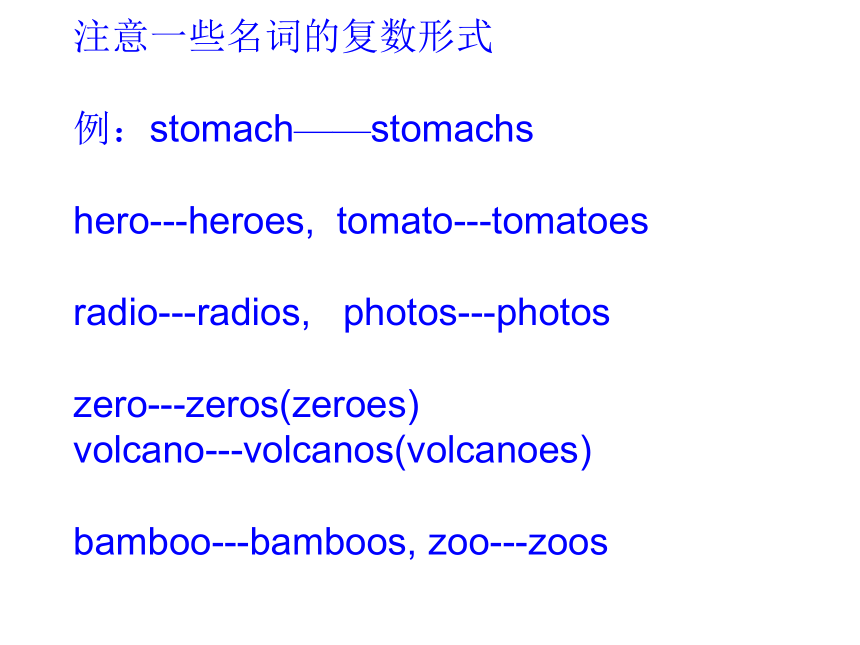
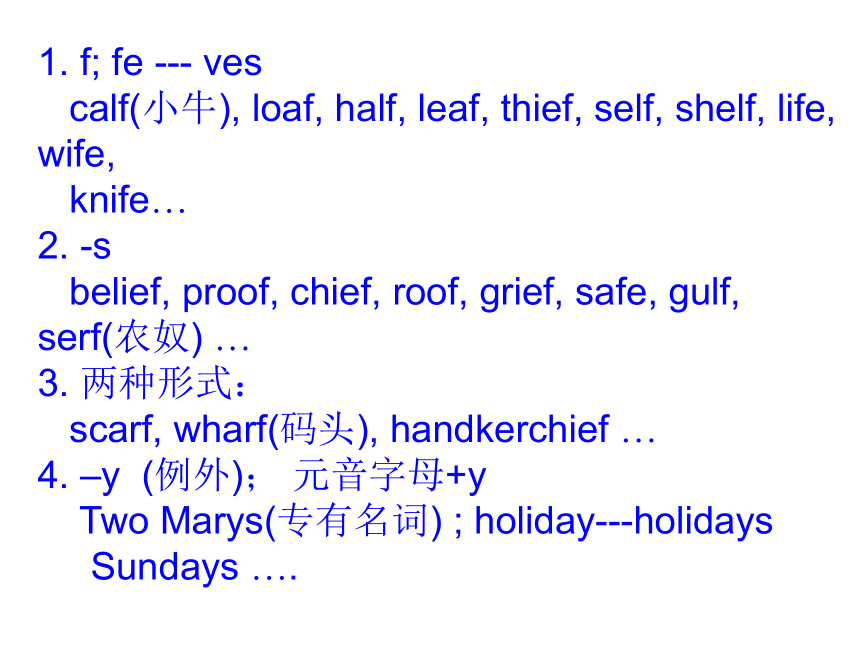
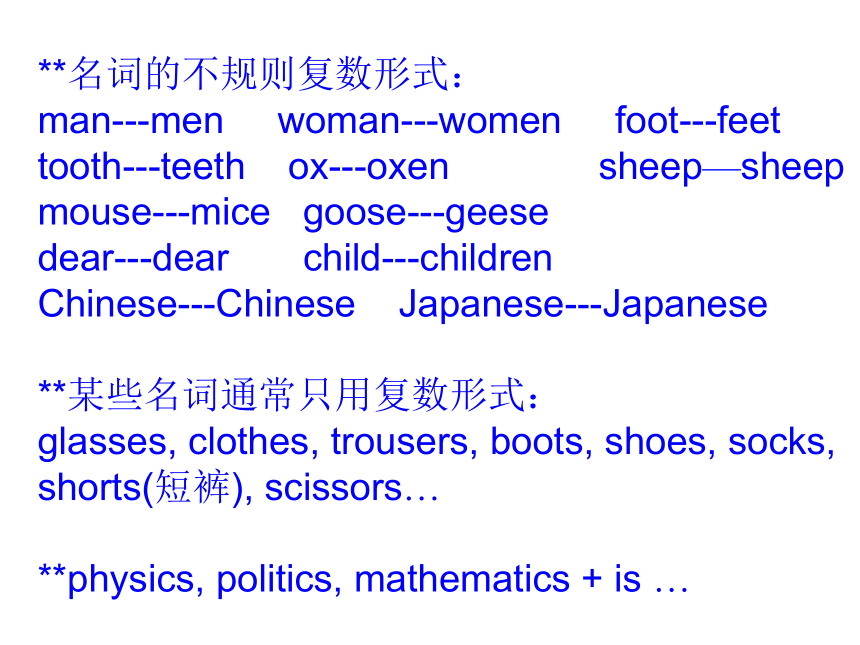
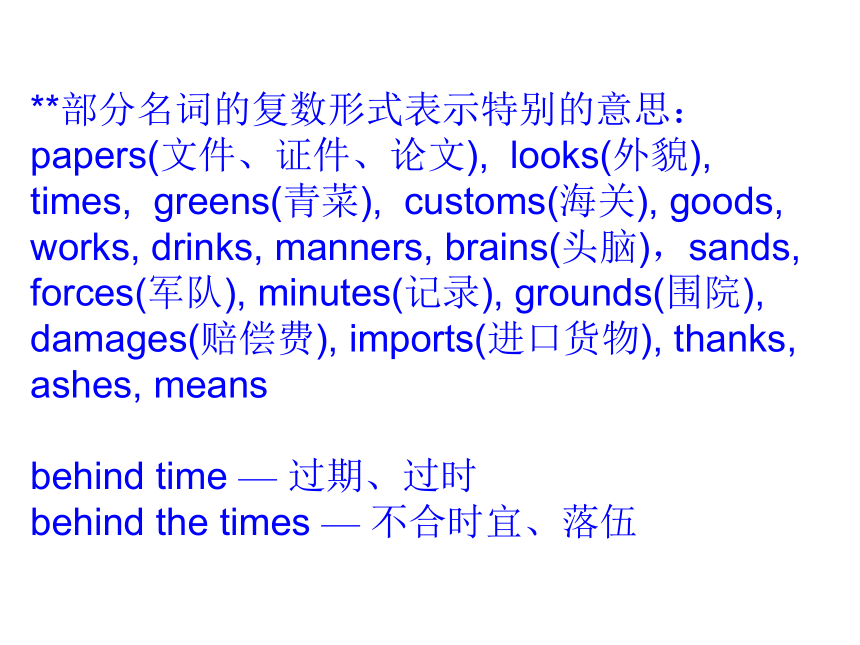
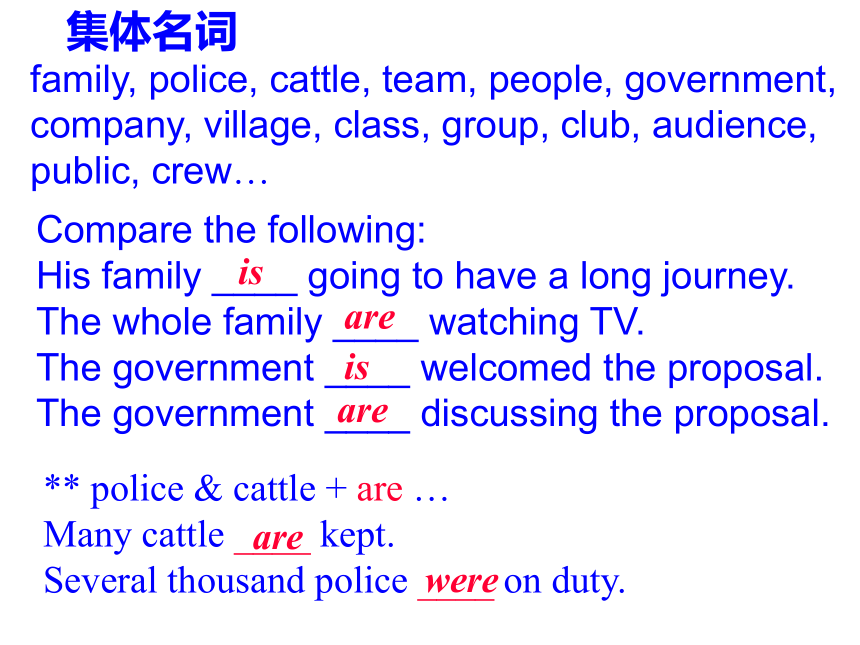
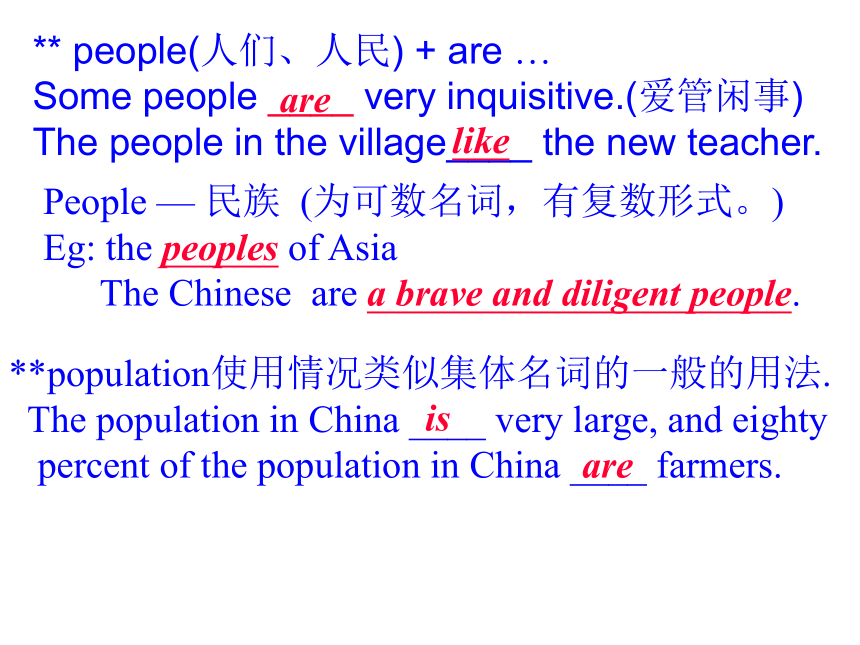
文档简介
课件23张PPT。Grammer NOUNI. 名词的定义
II. 名词的分类
有少数名词既可作可数名词,也可作不可数名词,
但含义不同。paper a paper youth a youth
glass a glass relation a relation
wood a wood power a power
iron an iron beauty a beauty
room a room fire a fire
chicken a chicken hair a hair
lamb a lamb trouble a trouble
difficulty a difficultyshame a shame pity a pity success a success pleasure a pleasure light lights kindness kindnesses food foods custom customs spirit spirits time times fruit fruits water waters sand sands knowledge a knowledge of English tea a well-known tea 注意一些名词的复数形式 例:stomach——stomachs hero---heroes, tomato---tomatoes radio---radios, photos---photos zero---zeros(zeroes) volcano---volcanos(volcanoes) bamboo---bamboos, zoo---zoos 1. f; fe --- ves calf(小牛), loaf, half, leaf, thief, self, shelf, life, wife, knife… 2. -s belief, proof, chief, roof, grief, safe, gulf, serf(农奴) … 3. 两种形式: scarf, wharf(码头), handkerchief … 4. –y (例外); 元音字母+y Two Marys(专有名词) ; holiday---holidays Sundays …. **名词的不规则复数形式: man---men woman---women foot---feet tooth---teeth ox---oxen sheep—sheep mouse---mice goose---geese dear---dear child---children Chinese---Chinese Japanese---Japanese **某些名词通常只用复数形式: glasses, clothes, trousers, boots, shoes, socks, shorts(短裤), scissors… **physics, politics, mathematics + is …**部分名词的复数形式表示特别的意思: papers(文件、证件、论文), looks(外貌), times, greens(青菜), customs(海关), goods, works, drinks, manners, brains(头脑),sands, forces(军队), minutes(记录), grounds(围院), damages(赔偿费), imports(进口货物), thanks, ashes, means behind time — 过期、过时 behind the times — 不合时宜、落伍 集体名词 family, police, cattle, team, people, government, company, village, class, group, club, audience, public, crew…Compare the following: His family ____ going to have a long journey. The whole family ____ watching TV.
The government ____ welcomed the proposal.
The government ____ discussing the proposal.is areisare** police & cattle + are …
Many cattle ____ kept.
Several thousand police ____ on duty. arewere** people(人们、人民) + are … Some people ____ very inquisitive.(爱管闲事) The people in the village____ the new teacher. arePeople — 民族 (为可数名词,有复数形式。)
Eg: the peoples of Asia
The Chinese are a brave and diligent people.**population使用情况类似集体名词的一般的用法.
The population in China ____ very large, and eighty
percent of the population in China ____ farmers. isarelike**合成名词的复数形式因词而异:主体名词变复数:
looker-on →lookers-on
grand-child →grandchildren
man-at-arms →men-at-arms
son-in-law →sons-in-law
editor-in-chief →editors-in-chief**没有主体名词的,在合成词的后面加复数。go-between →go-betweens (中间人)
grown-up →grown-ups
drawback →drawbacks(缺陷)****man teacher →men teachers
woman doctor →women doctors*** 字母、文字、数字、符号等的复数形式通常在其后加 ’s。Don’t use too many and’s and if’s.
Her 3’s look like 8’s.
All the “’s” should be changed to “△’s”.** 易混辨异A number of + ns + are …
The number of + ns + is …
Eg: A number of students are from the North.
The number of the students who spent the summer holidays in the countryside was 45.
Many a + n + is …
More than one + n + is …
Not even one of + ns + is …
Eg: Many a students has seen this painting.
More than one teacher has been to England.A large(great, good) quantity of + ns + are …
n + is …Large(great, good) quantities of + ns / n + are … Eg: A large of quantity of birds were saved by
the farmers.
Large quantities of water are needed for irrigation. A large amount of 和 Large amounts of
的用法与quantity相同。A large amount of damage has been done
by the earthquake.
Large amounts of money were spent on the bridge. Most of
Half of
Part of
Rest of + ns + are …
+ n + is …Eg: Most of his spare time was spent in reading.
Half of the apples are left on the table.** dozen, score, hundred, thousand, million等在表
示确定数时,不加-s; 表示不定数目时,则加-s,与of 连用。Eg: three hundred students
scores of times
thousands of workers
six dozen(score) pencils
a few/several hundred doctors由形容词加定冠词变成名词的名词性形容词,若该词指人,通常看作复数;但如果该形容词不是指人,而是指东西或思维活动,通常看作单数。青年人总是充满朝气。
The young are usually very active.
政府把老年人照顾得很好。
The old are well looked after by the government.
The beautiful is not always the same as the good.名词的格** ’s 所有格主要用于生物名词,有时也可用于表时间、城市、国家、机关、地名等的名词,如:yesterday’s news
Of短语式所有格
Of 短语式所有格修饰前面的名词,表示两个名词之间的所属关系,多用于无生命名词。
The biggest football game of the year; the computer of tomorrow 双重所有格Of + ’s式所有格(人称代词的名词性所有格)修饰前面的名词,这种结构叫名词双重所有格。
* of前的名词一定要的冠词、数词、不定代词、指示代词之类的修饰语,(one和 the除外)。
a novel of Lu Xun’s
** of后面的名词必须是特定的。
a book of my friend’s (不能说 a book of a certain friend’s)名词作定语Jack’s pen teachers’ office
A map of China
A friend of my brother’s
## 名词+名词
* 表材料的名词作定语,说明被修饰的名词是什么原料制成的。
Stone figures 石像 paper money 纸币
Diamond necklace 钻石项链 gold medals 金牌
**表示地点的名词作定语,说明被修饰的名词存在或发生的地点。
Country music 乡村音乐 post office 邮政局
Table cloth city life school education government office 政府机关
***表示用途、性质的名词作定语。
coffee cups book stores sports shoes food factory traffic lights
today’s newspaper ****表具体的时间名词作定语,则要用所有格结构来表示。
yesterday’s news an hour’s drive名词作副词*表示时间的名词前有one/some/this/that/last/next/every/all等词修饰时,前面不再加介词,独立作状语。
He kept writing all day.
She will go to Shanghai next week.
表示次数、距离、方向、程度、价值、状态的名词可用作副词状语。
I don’t care a bit.
He stood in front of me, cap in hand.
*在比较级的形容词或副词,及too…之前的名词,是副词不达意性的名词。
I got up an hour too early this morning.
I got up an hour earlier this morning.
I arrived at the airport an hour late.
**[a(=per)+名词]之前有表示数量的词时,a之后的名词也是副词性的名词。
Eg: The old lady goes to market only twice a month.
He can walk forty miles a day.
Such rainy days will last four weeks.
**有时附于表示“期间”的名词中的介词during, for 等可以省略时,剩下的名词就成为副词性的名词。
Eg: We waited there (for) two hours.
Nothing happened (during) the whole vacation.
The sports meet lasted three hours.
**表示时间的名词修饰其后的ago, since, before, after, week, month等词时,则是副词性的名词。
I happened to meet her two days ago.Thank you!
II. 名词的分类
有少数名词既可作可数名词,也可作不可数名词,
但含义不同。paper a paper youth a youth
glass a glass relation a relation
wood a wood power a power
iron an iron beauty a beauty
room a room fire a fire
chicken a chicken hair a hair
lamb a lamb trouble a trouble
difficulty a difficultyshame a shame pity a pity success a success pleasure a pleasure light lights kindness kindnesses food foods custom customs spirit spirits time times fruit fruits water waters sand sands knowledge a knowledge of English tea a well-known tea 注意一些名词的复数形式 例:stomach——stomachs hero---heroes, tomato---tomatoes radio---radios, photos---photos zero---zeros(zeroes) volcano---volcanos(volcanoes) bamboo---bamboos, zoo---zoos 1. f; fe --- ves calf(小牛), loaf, half, leaf, thief, self, shelf, life, wife, knife… 2. -s belief, proof, chief, roof, grief, safe, gulf, serf(农奴) … 3. 两种形式: scarf, wharf(码头), handkerchief … 4. –y (例外); 元音字母+y Two Marys(专有名词) ; holiday---holidays Sundays …. **名词的不规则复数形式: man---men woman---women foot---feet tooth---teeth ox---oxen sheep—sheep mouse---mice goose---geese dear---dear child---children Chinese---Chinese Japanese---Japanese **某些名词通常只用复数形式: glasses, clothes, trousers, boots, shoes, socks, shorts(短裤), scissors… **physics, politics, mathematics + is …**部分名词的复数形式表示特别的意思: papers(文件、证件、论文), looks(外貌), times, greens(青菜), customs(海关), goods, works, drinks, manners, brains(头脑),sands, forces(军队), minutes(记录), grounds(围院), damages(赔偿费), imports(进口货物), thanks, ashes, means behind time — 过期、过时 behind the times — 不合时宜、落伍 集体名词 family, police, cattle, team, people, government, company, village, class, group, club, audience, public, crew…Compare the following: His family ____ going to have a long journey. The whole family ____ watching TV.
The government ____ welcomed the proposal.
The government ____ discussing the proposal.is areisare** police & cattle + are …
Many cattle ____ kept.
Several thousand police ____ on duty. arewere** people(人们、人民) + are … Some people ____ very inquisitive.(爱管闲事) The people in the village____ the new teacher. arePeople — 民族 (为可数名词,有复数形式。)
Eg: the peoples of Asia
The Chinese are a brave and diligent people.**population使用情况类似集体名词的一般的用法.
The population in China ____ very large, and eighty
percent of the population in China ____ farmers. isarelike**合成名词的复数形式因词而异:主体名词变复数:
looker-on →lookers-on
grand-child →grandchildren
man-at-arms →men-at-arms
son-in-law →sons-in-law
editor-in-chief →editors-in-chief**没有主体名词的,在合成词的后面加复数。go-between →go-betweens (中间人)
grown-up →grown-ups
drawback →drawbacks(缺陷)****man teacher →men teachers
woman doctor →women doctors*** 字母、文字、数字、符号等的复数形式通常在其后加 ’s。Don’t use too many and’s and if’s.
Her 3’s look like 8’s.
All the “’s” should be changed to “△’s”.** 易混辨异A number of + ns + are …
The number of + ns + is …
Eg: A number of students are from the North.
The number of the students who spent the summer holidays in the countryside was 45.
Many a + n + is …
More than one + n + is …
Not even one of + ns + is …
Eg: Many a students has seen this painting.
More than one teacher has been to England.A large(great, good) quantity of + ns + are …
n + is …Large(great, good) quantities of + ns / n + are … Eg: A large of quantity of birds were saved by
the farmers.
Large quantities of water are needed for irrigation. A large amount of 和 Large amounts of
的用法与quantity相同。A large amount of damage has been done
by the earthquake.
Large amounts of money were spent on the bridge. Most of
Half of
Part of
Rest of + ns + are …
+ n + is …Eg: Most of his spare time was spent in reading.
Half of the apples are left on the table.** dozen, score, hundred, thousand, million等在表
示确定数时,不加-s; 表示不定数目时,则加-s,与of 连用。Eg: three hundred students
scores of times
thousands of workers
six dozen(score) pencils
a few/several hundred doctors由形容词加定冠词变成名词的名词性形容词,若该词指人,通常看作复数;但如果该形容词不是指人,而是指东西或思维活动,通常看作单数。青年人总是充满朝气。
The young are usually very active.
政府把老年人照顾得很好。
The old are well looked after by the government.
The beautiful is not always the same as the good.名词的格** ’s 所有格主要用于生物名词,有时也可用于表时间、城市、国家、机关、地名等的名词,如:yesterday’s news
Of短语式所有格
Of 短语式所有格修饰前面的名词,表示两个名词之间的所属关系,多用于无生命名词。
The biggest football game of the year; the computer of tomorrow 双重所有格Of + ’s式所有格(人称代词的名词性所有格)修饰前面的名词,这种结构叫名词双重所有格。
* of前的名词一定要的冠词、数词、不定代词、指示代词之类的修饰语,(one和 the除外)。
a novel of Lu Xun’s
** of后面的名词必须是特定的。
a book of my friend’s (不能说 a book of a certain friend’s)名词作定语Jack’s pen teachers’ office
A map of China
A friend of my brother’s
## 名词+名词
* 表材料的名词作定语,说明被修饰的名词是什么原料制成的。
Stone figures 石像 paper money 纸币
Diamond necklace 钻石项链 gold medals 金牌
**表示地点的名词作定语,说明被修饰的名词存在或发生的地点。
Country music 乡村音乐 post office 邮政局
Table cloth city life school education government office 政府机关
***表示用途、性质的名词作定语。
coffee cups book stores sports shoes food factory traffic lights
today’s newspaper ****表具体的时间名词作定语,则要用所有格结构来表示。
yesterday’s news an hour’s drive名词作副词*表示时间的名词前有one/some/this/that/last/next/every/all等词修饰时,前面不再加介词,独立作状语。
He kept writing all day.
She will go to Shanghai next week.
表示次数、距离、方向、程度、价值、状态的名词可用作副词状语。
I don’t care a bit.
He stood in front of me, cap in hand.
*在比较级的形容词或副词,及too…之前的名词,是副词不达意性的名词。
I got up an hour too early this morning.
I got up an hour earlier this morning.
I arrived at the airport an hour late.
**[a(=per)+名词]之前有表示数量的词时,a之后的名词也是副词性的名词。
Eg: The old lady goes to market only twice a month.
He can walk forty miles a day.
Such rainy days will last four weeks.
**有时附于表示“期间”的名词中的介词during, for 等可以省略时,剩下的名词就成为副词性的名词。
Eg: We waited there (for) two hours.
Nothing happened (during) the whole vacation.
The sports meet lasted three hours.
**表示时间的名词修饰其后的ago, since, before, after, week, month等词时,则是副词性的名词。
I happened to meet her two days ago.Thank you!
